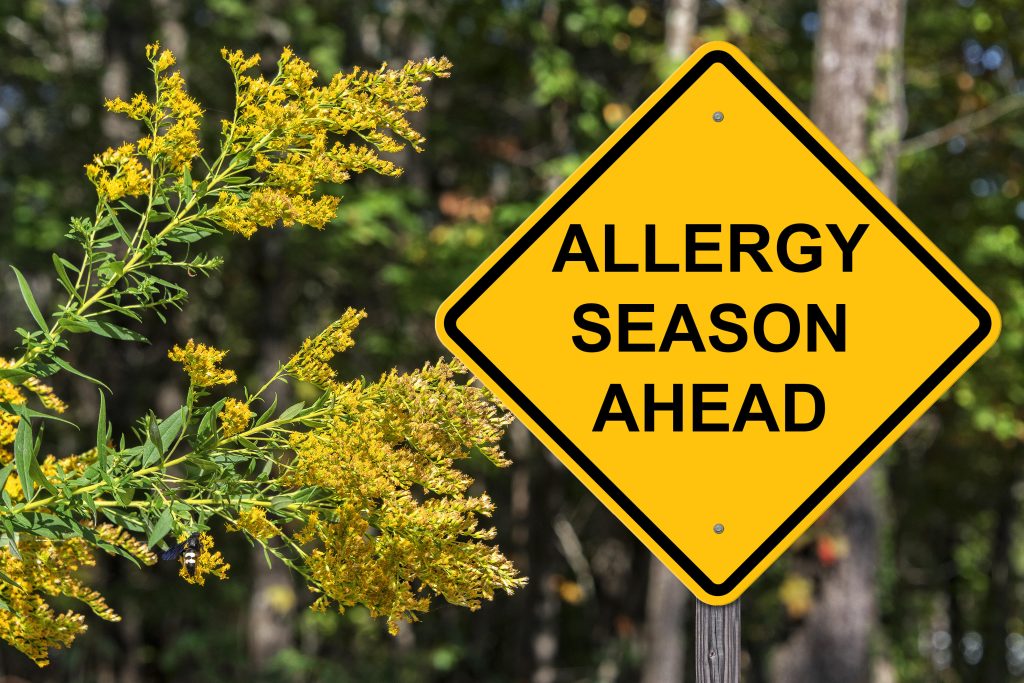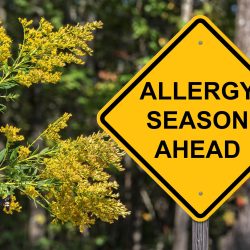Seasonal allergies, also known as hay fever or allergic rhinitis, affect millions of people worldwide. As the seasons change, so does the prevalence of allergens in the air, triggering a cascade of symptoms that can range from mildly irritating to significantly disruptive. In this blog post, we’ll delve into what seasonal allergies are, their causes, and explore effective treatment approaches, including lifestyle interventions.
Seasonal allergies occur when the immune system overreacts to airborne allergens, most commonly pollen from trees, grasses, and weeds but can also be triggered by dust mites, dogs, cats or other prized pets. As these allergens enter the body, the immune system produces histamines, triggering symptoms like sneezing, itching, congestion, and watery eyes. Leukotrienes are inflammatory mediators produced by the immune system in response to allergens or irritants as well. They contribute to the symptoms of allergic rhinitis (such as sneezing, nasal congestion, and itching, as well as asthma. The timing of these allergies depends on the specific allergen, with tree pollen prevalent in spring, grass pollen in late spring and early summer, and weed pollen in late summer and fall.
The primary culprits behind seasonal allergies are airborne pollens released by trees, grasses, and weeds. Mold spores can also contribute to allergic reactions, especially in damp environments. Genetic factors play a role, as individuals with a family history of allergies are more susceptible.
Treatment Approaches:
- Antihistamines: Over-the-counter (OTC) antihistamines, such as cetirizine and loratadine, can effectively alleviate symptoms by blocking histamine release. New antihistamines, such as levocetirizine have also come down in price in the past few years.
- Decongestants: OTC decongestants like pseudoephedrine can provide relief from nasal congestion, but they should be used with caution due to potential side effects like increased blood pressure. Nasal Decongestants should only be used for a few days at a time, as they can paradoxically lead to rebound congestion.
- Nasal Saline Rinses: Nasal saline rinses are a popular and often recommended home remedy for managing symptoms of seasonal allergies. The rationale behind nasal saline rinses for treating seasonal allergies lies in their ability to alleviate nasal congestion, reduce inflammation, and flush out allergens from the nasal passages.
- Nasal Corticosteroids: Prescription or OTC nasal corticosteroid sprays, such as fluticasone and mometasone, can reduce inflammation in the nasal passages, offering relief from congestion and other symptoms. It is recommended to use a nasal saline rinse to flush the mucus prior to using the nasal steroid so the medicine can get maximum exposure to the affected tissues.
- Montelukast: Montelukast works by blocking the action of leukotrienes, specifically targeting the receptors where leukotrienes bind. By inhibiting leukotriene activity, it helps reduce inflammation, bronchoconstriction, and other symptoms associated with allergic reactions.
- Allergy Shots (Immunotherapy) or Sublinqual Allergy Drops: For severe cases, allergists may recommend allergy shots, a series of injections containing small amounts of allergens to desensitize the immune system over time. Newer on the scene is research showing that sublingual drops (under the tongue) are an effective alternative to the shots.
- Steroid Injections: Systemic steroids blunt the immune response to allergens and a one time shot can provide several weeks of benefit at a time. They drawback is that steroids can have side effects including agitation, irritability, increased appetite, so these are not for everyone.
Lifestyle Interventions:
- Air Purifiers: Using HEPA air purifiers at home can help reduce airborne allergens.
- Allergen Avoidance: Stay indoors during peak pollen times, keep windows closed, and use air conditioning with a clean filter.
- Saline Nasal Rinses: Regular nasal rinses with saline solutions can help clear allergens from nasal passages.
Diet and Supplements:
- Quercetin: Some studies suggest that quercetin, found in fruits and vegetables, may have anti-allergic properties. However, more research is needed.
- Omega-3 Fatty Acids: Foods rich in omega-3 fatty acids, such as fatty fish and flaxseeds, may help reduce inflammation.
- Local Honey: While anecdotal, some individuals find relief by consuming local honey, believing it helps build tolerance to local pollens. Scientific evidence is limited.
Exercise: Regular exercise can enhance overall health and may have a positive impact on immune function. However, it’s essential to choose indoor activities during peak pollen seasons to minimize exposure.
Seasonal allergies can be a challenging annual hurdle for many, but with a proactive approach, individuals can manage symptoms effectively. Understanding the causes, adopting preventive measures, and utilizing a combination of medications and lifestyle interventions can significantly improve the quality of life for allergy sufferers. As with any medical condition, it’s crucial to consult with a healthcare professional to determine the most suitable treatment plan and minimize the risk of potential side effects.



